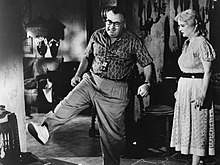
Back Robert Aldrich AN روبيرت الدريتش ARZ Робърт Олдрич Bulgarian Robert Aldrich Catalan Robert Aldrich Danish Robert Aldrich German Ρόμπερτ Όλντριτς Greek Robert Aldrich Spanish Robert Aldrich Basque رابرت آلدریچ Persian
Robert Aldrich | |
|---|---|
 Aldrich directing Bette Davis during filming of What Ever Happened to Baby Jane? (1962) | |
| Born | Robert Burgess Aldrich August 9, 1918 Cranston, Rhode Island, U.S. |
| Died | December 5, 1983 (aged 65) Los Angeles, California, U.S. |
| Resting place | Forest Lawn Memorial Park (Hollywood Hills) |
| Alma mater | University of Virginia |
| Occupations |
|
| Years active | 1945–1981 |
| Spouses | Harriet Foster
(m. 1941; div. 1965)Sibylle Siegfried
(m. 1966–1983) |
| Children | 4 (with Foster) |
| Awards | Silver Lion for The Big Knife (1955) |
| 15th National President of the Directors Guild of America | |
| In office 1975–1979 | |
| Preceded by | Robert Wise |
| Succeeded by | George Schaefer |
Robert Burgess Aldrich (August 9, 1918 – December 5, 1983) was an American film director, producer, and screenwriter. An iconoclastic and maverick auteur[1] working in many genres during the Golden Age of Hollywood, he directed mainly films noir, war movies, westerns and dark melodramas with Gothic overtones. His most notable credits include Vera Cruz (1954), Kiss Me Deadly (1955), The Big Knife (1955), Autumn Leaves (1956), Attack (1956), What Ever Happened to Baby Jane? (1962), Hush...Hush, Sweet Charlotte (1964), The Flight of the Phoenix (1965), The Dirty Dozen (1967), and The Longest Yard (1974).
Containing a "macho mise-en-scene and resonant reworkings of classic action genres,"[2] Aldrich's films were known for pushing the boundaries of violence in mainstream cinema, as well as for their psychologically-complex interpretations of genre film tropes.[3] The British Film Institute wrote that Aldrich's work displays "a subversive sensibility in thrall to the complexities of human behaviour."[4] Several of his films later proved influential to members of the French New Wave.[5][6]
Aside from his directorial work, Aldrich was also noted for his advocacy as a member of the Directors Guild of America, serving as its President for two terms, and becoming the namesake for its Robert B. Aldrich Achievement Award.[7]
- ^ "The Truculent Cinema of Robert Aldrich". MUBI. September 16, 2016. Retrieved May 7, 2023.
- ^ "Robert Aldrich". www.tcm.com. Retrieved May 7, 2023.
- ^ Cite error: The named reference
Pattersonwas invoked but never defined (see the help page). - ^ "Robert Aldrich: 10 essential films". BFI. August 9, 2018. Retrieved May 7, 2023.
- ^ Coates, Kristen (May 28, 2010). "French New Wave: The Influencing of the Influencers". Retrieved May 7, 2023.
- ^ "The Truffaut Essays That Clear Up Misguided Notions of Auteurism". The New Yorker. June 8, 2019. Retrieved May 7, 2023.
- ^ "DGA Quarterly Magazine | Winter 2019 | The Real Robert Aldrich". www.dga.org. Retrieved May 7, 2023.